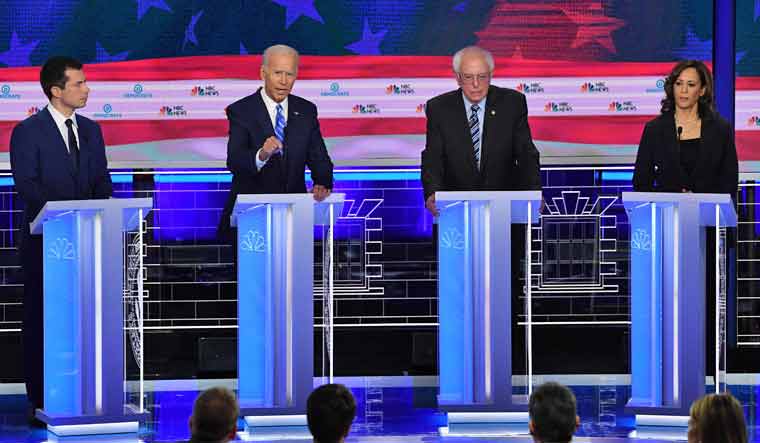Night Two of the the first round of the Democratic presidential debates ended on Thursday with candidates trying to prove themselves to be the best to take on President Donald Trump, who is aiming at a second term in office.
As the front-runner for the Democratic presidential candidate for the 2020 elections, former vice president Joe Biden faced the brunt of multiple attacks.
Kamala Harris called Biden out on the remarks he made at the Carlyle Hotel in New York City on June 18 when he reminisced about the politics of the 1970s, even when it meant working with staunch segregationists who believed that black and white people should not be living in the same area.
“I do not believe you are a racist and I agree with you when you commit yourself to the importance of finding common ground. But, I also believe—and it’s personal. And I—I was actually very—it was hurtful to hear you talk about the reputations of two United States senators who built their reputations and career on segregation of race in this country. And it was not only that, but you also worked with them to oppose busing,” Harris said.
Desegregation busing is a policy that impartially assigns and transports students to their schools. Due to residential segregation, American public schools that are based on locality would only have children of one race, and so to redress this problem and promote integration, busing was suggested.
In her speech, Harris also invoked her personal experience with busing: “There was a little girl in California who was part of the second class to integrate her public schools and she was bused to school every day and that little girl was me. So, I will tell you that on this subject, it cannot be an intellectual debate among Democrats. We have to take it seriously. We have to act swiftly.”
Biden countered Harris by saying that her statement was a “mischaracterisation of my position across the board”.
He said, “I did not praise racists. That is not true, number one. Number two, if we want to have this campaign litigated on who supports civil rights and whether I did or not, I’m happy to do that.” He then pointed out that as the vice president of the United States he “worked very hard to see to it we dealt with these issues in a major, major way.”
Regarding busing he said, “I did not oppose busing in America. What I opposed is busing ordered by the Department of Education. That’s what I opposed.”
Harris was not the only Democrat to go after Biden. Another Democratic candidate, Eric Swalwell took Biden on a trip down the memory lane when he talked about Biden’s speech from 1987 and used Biden’s words against him.
“I was 6-years-old when a presidential candidate came to the California Democratic convention and said it’s time to pass the torch to a new generation of Americans,” Swalwell said. “That candidate was then-senator Joe Biden. Joe Biden was right when he said it was time to pass the torch to a new generation of Americans 32 years ago. He’s still right today.”
However both, Harris and Swalwell’s swing at Biden will only cause minimal damage, as Biden is still seen as the most electable candidate among the Democrat voters and will easily meet the criteria for the second round of debates which is a minimum of 2 per cent support in four polls and 130,000 unique donors with at least 400 donors each in 20 states.



